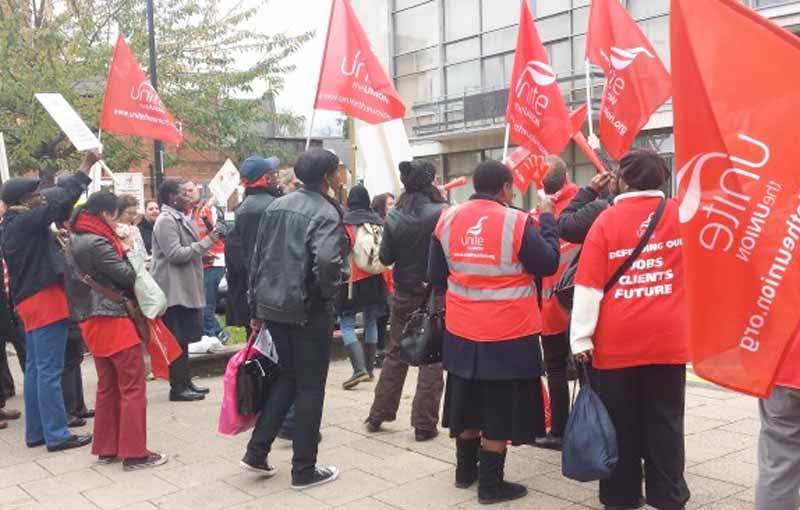 Workers at homeless charity St Mungo’s Broadway demonstrated outside Haringey Civic Centre
Workers at homeless charity St Mungo’s Broadway demonstrated outside Haringey Civic Centre
Reuben Bard-Rosenberg reports from Haringey on the final day of a week long strike by workers at a homless charity against huge pay cuts
On Friday workers at homeless charity St Mungo’s Broadway demonstrated outside Haringey Civic Centre, as they marked the final day of their week long strike. “One director told us that we wouldn’t find any work elsewhere because we were unemployable”, one worker told me.
With bosses like this, its perhaps possible to understand the anger, and the unusual energy, that characterised yesterday’s action in Wood Green – one of several taking place across London.
“We’re here because there was a change in management, and after that they adopted crazy policies, cutting down everybody’s wages by 19 per cent and giving a £30,000 pay rise to the chief executive” said Jane, who’d been on strike all week. The management had changed when homeless charity St Mungo’s merged with Broadway, an employment charity, and Broadway boss Howard Sinclair became the chief exec of the new merged organisation.
I’ve been to strike related actions that felt a bit like they were “going through the motions”. This wasn’t one of them. It was noisy, it was participatory and it was lead by the workers themselves.
One person who’d come along to support his striking friend told he was impressed, and a pleasantly surprised by how brash they were. Indeed the workers on strike don’t fit the (inaccurate) stereotype of what an industrial militant looks like. They’re mostly women and their in a “caring profession”. As one woman acknowledged, concern amongst workers for vulnerable clients did influence the willingness of some workers to strike.
Yet as the workers I spoke to yesterday explained to me, it was because of their role in looking out for clients – because of their determination to make sure that St Mungo’s continues to be something more than a warehouse for the needy – that they were fighting back. Philipa who works in a hostel told me:
“We want what’s best for them in the long term, and that means we have to fight back now, because you keep devaluing the work that is done and reducing pay we aren’t able provide a proper service. If staff keep leaving after 6 months then there’s no way of building staff knowledge.”
She also said that striking staff were setting a good example for clients, many of whom will of course have to fight hard to get what they need from the government. “We’re showing that you can and should stand up for yourself” she said.
St Mungo’s has historically prided itself in being about more than grabbing council contracts and fulfilling them at the lowest possible cost. And for Jane, this strike is about making sure that this tradition continues. “We’re also trying to preserve the reputation of St Mungo’s as working with the most difficult people, the most challenging people” she said. What the new management want is just market driven, tick box exercises.” What’s particularly galling for staff is that St. Mungo’s won many of its council contracts prior to its merger with Broadway, and did so on the basis that it didn’t race to the bottom, that it provided a good service and that treated staff decently.
Onward to more action?
As of the morning of Friday 24th, the week long strike is at an end. Management don’t appear to be backing down, and on Tuesday the workers are meeting again to decide on the way forward. I asked Erica how she thought it was going to go. She said that there was widespread feeling that what they’d done over the last week wouldn’t be enough. People would, she said, be concerned about losing pay, and about their clients but she was fairly confident that more strike action would be supported – as was everybody else that I spoke to. Certainly the amount of initiative being taken by rank and file workers at yesterday’s event is a good sign.
At the same time it is imperative to support the workers in this strike, by getting down to the rallies and the picket line, by spreading the word, and by contributing to the strike fund.
Notes
Some of the names have been changed to protect the identities of people we spoke to.

